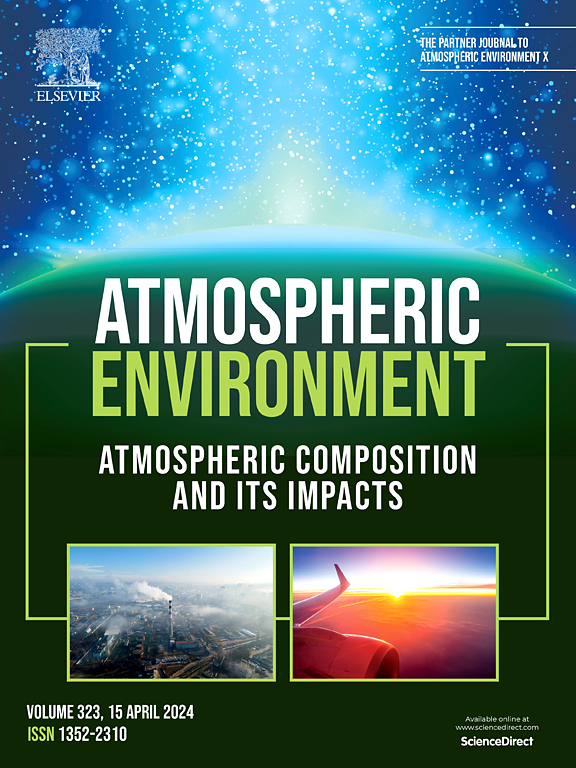2020 年 COVID-19 封锁对英国城市大气中非甲烷挥发性有机化合物浓度的影响
IF 4.2
2区 环境科学与生态学
Q2 ENVIRONMENTAL SCIENCES
引用次数: 0
摘要
COVID-19 禁排带来的空气质量变化可以为了解长期减排如何影响大气成分提供有价值的见解。在英国莱斯特市,2020 年 COVID "禁排 "使大气成分发生了一些显著变化,包括非甲烷挥发性有机化合物 (NMVOC) 的浓度大幅下降(20-60%)。由于非甲烷挥发性有机化合物的排放源和生命周期各不相同,因此非甲烷挥发性有机化合物数据可以为了解行为变化如何影响大气成分提供有价值的信息。路边(RS)站点的 48 种 NMVOCs 总浓度从封锁前(2020 年 3 月 16 日至 24 日采样)的 181.3 ± 41.4 μg/m3 降至封锁期间(LD,2020 年 5 月 18 日至 21 日采样)的 82.0 ± 12.8 μg/m3,然后反弹至封锁后(LD 后,2020 年 9 月 14 日至 17 日采样)的 236.3 ± 23.9 μg/m3。城市本底(UB)站点也观察到类似的模式,在封锁期间,浓度从封锁前(LD 前)的 123.2 ± 24.6 μg/m3 降至 96.8 ± 39.5 μg/m3,然后在 LD 后升至 168.6 ± 29.1 μg/m3。这归因于氮氧化物排放量的减少以及随后氧化物的重新生成。这项研究评估了车辆和相关人为排放物的变化对空气质量的定量影响,为制定未来的空气污染控制措施提供了宝贵的见解。本文章由计算机程序翻译,如有差异,请以英文原文为准。
Impact of the 2020 COVID-19 lockdown on the concentration of non-methane volatile organic compounds in a UK urban atmosphere
The changes in air quality brought about by the COVID-19 lockdowns can provide valuable insight into how longer-term reductions in emissions might affect atmospheric composition. In urban Leicester UK, the 2020 COVID “lockdown” brought about several notable changes in atmospheric composition, including a considerable decrease (20–60%) in concentrations of non-methane volatile organic compounds (NMVOCs). Given their varied emission sources and lifetimes, NMVOC data can give valuable insights into how behavioural change impact atmospheric composition. The total concentration of 48 NMVOCs at roadside (RS) sites decreased from a pre-lockdown (sampled 16th-24th March 2020) concentration of 181.3 ± 41.4 μg/m3 to 82.0 ± 12.8 μg/m3 during lockdown (LD, sampled 18th-21st May 2020), before rebounding to a concentration of 236.3 ± 23.9 μg/m3 post lockdown (post-LD, sampled 14th-17th Sept 2020). A similar pattern was observed at urban background (UB) sites with concentrations reducing during lockdown to 96.8 ± 39.5 μg/m3 from a pre-lockdown (pre-LD) concentration of 123.2 ± 24.6 μg/m3 and then increasing to 168.6 ± 29.1 μg/m3 post-LD.
Generally, despite the decrease in NMVOC concentrations during the LD, an increase in level was observed. This was attributed to decreased emissions of and the subsequent repartioning of Ox. This research assessed the quantitative effect of changes in vehicular and related anthropogenic emissions on air quality, providing valuable insights for the formulation of future air pollution controls.
求助全文
通过发布文献求助,成功后即可免费获取论文全文。
去求助
来源期刊

Atmospheric Environment
环境科学-环境科学
CiteScore
9.40
自引率
8.00%
发文量
458
审稿时长
53 days
期刊介绍:
Atmospheric Environment has an open access mirror journal Atmospheric Environment: X, sharing the same aims and scope, editorial team, submission system and rigorous peer review.
Atmospheric Environment is the international journal for scientists in different disciplines related to atmospheric composition and its impacts. The journal publishes scientific articles with atmospheric relevance of emissions and depositions of gaseous and particulate compounds, chemical processes and physical effects in the atmosphere, as well as impacts of the changing atmospheric composition on human health, air quality, climate change, and ecosystems.
 求助内容:
求助内容: 应助结果提醒方式:
应助结果提醒方式:


